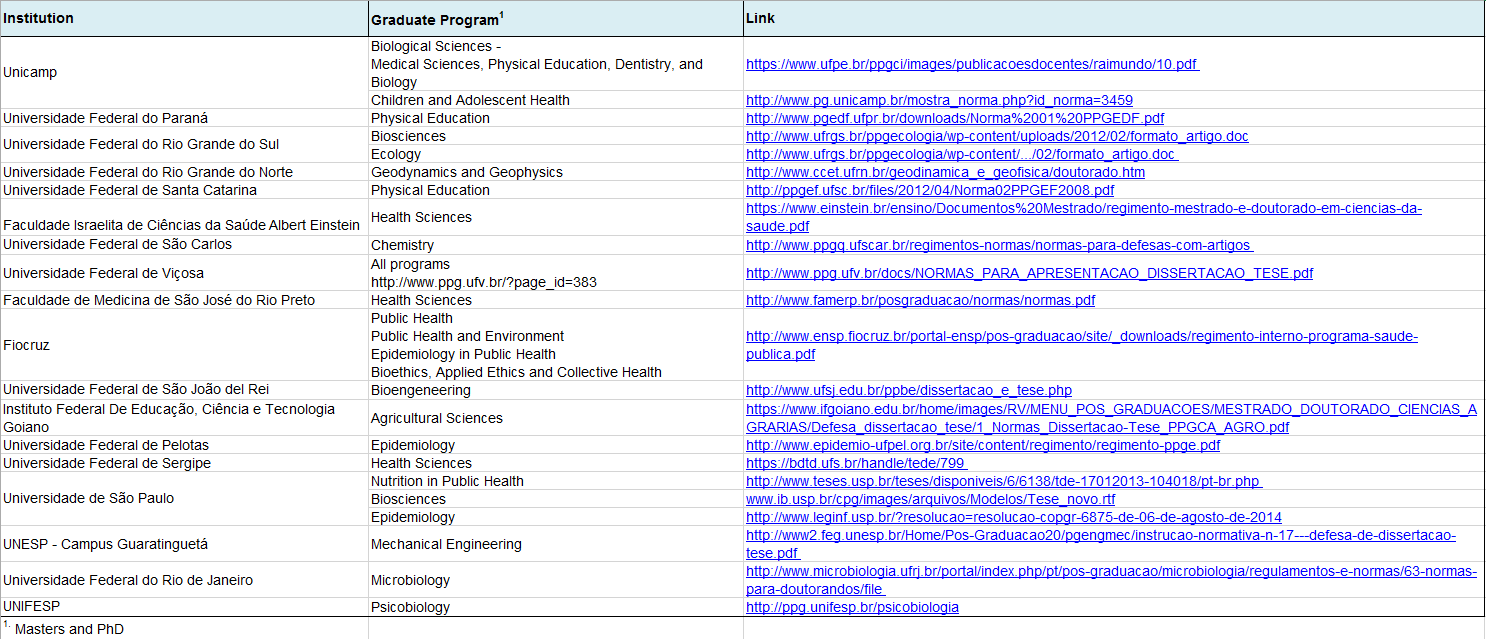By Lilian Nassi-Calò
Scholarly communication undergoes changes and evolves as science itself. The scientific article, its format and publication mode, dissemination and sharing has undergone significant changes since the emergence of the first scientific journals in the seventeenth century. The Internet, in the 1990s, dramatically changed the paradigm of science communication, an event comparable only to the invention of printing by Gutenberg in 1440, which enabled the dissemination of articles and journals to other instances, beyond the academy.
Dissertations and theses are monographs that constitute elements of scientific communication, but their primary role is to demonstrate that the candidate of an academic title is able to drive and communicate independent and original research.
The July 7, 2016 editorial of Nature1 brings peculiar information, “According to one of those often-quoted statistics that should be true but probably isn’t, the average number of people who read a PhD thesis all the way through is 1.6. And that includes the author”. The text goes on questioning what would be the number of theses that the typical researcher – and reader of Nature – has read in full. According to the same editorial, it possibly would not reach the 1.6 benchmark. The volume of theses, however, will continue to increase, since thousands of masters and PhD candidates in the world will face this rite of passage that is the gateway to the academic world or the professional market. The theses and dissertations database of the Coordination for the Improvement of Higher Education Personnel (CAPES), an agency of the Ministry of Education of Brazil, registers 901,096 documents from 1987 to August 2016.
Given this scenario, all stand to gain if the theses and dissertations are concise and objective. Information from the largest doctoral theses database, ProQuest, located in Ann Arbor, Michigan, USA, indicates that the average number of pages of a thesis increased from about 100 in the 1950s to around 200 currently, a fact mentioned in Julie Gold’s paper in Nature2. Obviously, the number of pages is not proportional to the quality and originality of the work, however, despite this, it is difficult to educate students to reduce the theses’ volume, which would make them easier to write, read and appraise.
If the thesis itself has a similar structure in many countries, there is great diversity in the way it is evaluated and the candidate is argued. The thesis defence or viva voce (in Latin) has different forms in the countries. In the Netherlands, the defence has several examiners and includes a brief presentation of the work by the applicant, being open to the public. In Australia, the printed volume of the thesis is sent to the examiners who make comments in writing and return it to the candidate. He or she will make a presentation later, but this will not influence the final result. In Brazil, there are institutions that conduct thesis defences open to the public; others do a private session that includes only the candidate, the supervisor and a panel of examiners.
In order to expedite the writing and assessment of the thesis, institutions and graduate programs in several countries, including Brazil, are opting to allow candidates who have published articles on their masters or doctorate research, to replace some of the thesis chapters by these articles, headed by an introduction, conclusion and a review of the scientific literature. The criteria to judge which articles can replace the wording of the thesis is in charge of the graduate programs coordination. CAPES, the body that assesses graduate courses throughout Brazil, recognizes this modality of theses, as well as FAPESP and Research Foundations from other states, for scholarship and grant purposes. The fact that the candidate has published papers in well evaluated journals, however, does not exempt the dissertation or thesis defence, which must take place in accordance to the criteria established by the higher education institution.
Table 1, which is not exhaustive, includes graduate programs in Brazil that specifically allow the option of alternative thesis format in the norms of graduate programs. Interestingly, major universities leave the discretion of each program the adoption of this thesis format, since there are significant differences between the areas of knowledge with regard to publication in scientific journals. The University of São Paulo, for example, provides the graduate programs to set the format in which the dissertation / thesis shall be presented, through Article 90 of Resolution 6875 of August 6, 2014 of the Graduate Regiment3. It is known that the areas of Natural Sciences generate more publications than the Social Sciences and Humanities, where the publication of books and book chapters often exceeds that of journal articles. The areas of Computer Science and Engineering have as an important dissemination channel of research results conference proceedings and technical manuals.
This modality is favorably viewed by researchers and students, as it stimulates the publication of articles, and is less laborious than writing a 200 page thesis. Not that publishing journal articles is an easy task, far from it. The academic community, particularly from developing countries, makes a significant effort to write and publish articles – especially in English – in quality journals. But if the papers are published during the masters or doctorate research, it avoids employing valuable time in writing a traditional style thesis.
The importance of the topic was evidenced by a workshop organized by the Australian Council of Learned Academies (ACOLA) in Melbourne in January 2016. The meeting aimed at the reform of the thesis format as part of the review process of research training, which is the main purpose of the master’s and doctoral programs. Shirley Tilghman, a molecular biologist and former president of Princeton University in New Jersey, USA, however, is not in favor of adopting the alternative format of theses, because “they demonstrate the candidate’s ability to frame the historical context of a problem, describe in detail the purpose and execution and then come to a credible conclusion”.
At the Karolinska Institute in Stockholm, Sweden, most of the theses are a compilation of articles published by students followed by a discussion, in a 50 page volume in total. In the view of the leaders of this institution, the publication should be an important part of master’s and doctorate academic training, since it enables candidates to enter the research career. Others, however, such as Jeremy Farrar, research director of Biomedicine at Wellcome Trust in London, UK, fear that the emphasis on article publishing during postgraduate studies would limit the focus of the doctorate to a mere paper factory. Moreover, the time for writing, submitting and peer reviewing articles may not coincide with the deadlines for presentation and defence of the thesis. In this sense, it is extremely timely the comment by Joy Burrough-Boenisch from Renkum, The Netherlands4. He advises to inform editors and peer reviewers, and even language professionals, that this particular article will be evaluated as part of obtaining an academic title, which may influence the time and in the way peer review is conducted.
Anyway, supporters or not of the alternative format agree that articles are most read and cited, and theses that remain only on library shelves and are not read or consulted have no reason to be. However, many researchers state their theses written over 20 years ago are still read and consulted by students and newly entered researchers in their laboratories. The Nature editorial1 that discusses the thesis format seems to capture the candidates’ feeling by saying that “students in the process of writing a thesis are in a very dark place indeed: lost in information, overwhelmed by literature, stuck for the next sentence, seduced by procrastination and wondering why on earth they signed up to this torture at all”.
Whatever the format of the thesis, the assessment by a panel of examiners is paramount for granting the title. In Israel, for example, defence is optional, and few students choose to go through it. As noted above, in The Netherlands it is a formal and open procedure, while in the UK, it is an event reserved only to the candidate and the examiners. In Australia, mainly for logistical and costs reasons, there is no proper defence, the thesis is only given to the examiners, who return it with comments. Moreover, the supporters of this process claim that oral defence rarely changes the outcome of the doctorate. In fact, institutions prefer not to reduce the number of doctors and masters, which weigh positively on university rankings. Moreover, it is really unlikely that a candidate who has gone through the entire process – assuming that there are effective mechanisms along the way – end up failing the final step – the thesis defence. Anyway, it is worth mentioning that a single model will not serve to different countries, institutions and areas of knowledge.
As for the evaluation of the candidate to an academic title it is worth mentioning Tilghman, who claims to be “only possible to really evaluate a student at the 25 year reunion. In the end, the only way you can assess it whether the graduates of the program became successful scientists. If they do, you’ve done a good job. If they haven’t, you haven’t”.
Table 1. Graduate programs that allow Masters and PhD candidates to gather scientific papers as a substitute of the traditional thesis or dissertation.
Notes
1. The past, present and future of the PhD thesis. Nature. 2016, vol. 535, nº 7610, pp. 7-7. DOI: 10.1038/535007a
2. GOLD, J. What’s the point of the PhD thesis? Nature. 2016, vol. 535, nº 7610, pp. 26-28. DOI: 10.1038/535026a
3. Resolução CoPGr 6875, de 06 de Agosto de 2014. Universidade de São Paulo. 2014. Available from: http://www.leginf.usp.br/?resolucao=resolucao-copgr-6875-de-06-de-agosto-de-2014
4. BURROUGH-BOENISCH, J. PhD thesis: Being more open about PhD papers. Nature. 2016, vol. 536, nº 7616, pp. 274-274. DOI: 10.1038/536274b
References
BURROUGH-BOENISCH, J. PhD thesis: Being more open about PhD papers. Nature. 2016, vol. 536, nº 7616, pp. 274-274. DOI: 10.1038/536274b
GOLD, J. What’s the point of the PhD thesis? Nature. 2016, vol. 535, nº 7610, pp. 26-28. DOI: 10.1038/535026a
Resolução CoPGr 6875, de 06 de Agosto de 2014. Universidade de São Paulo. 2014. Available from: http://www.leginf.usp.br/?resolucao=resolucao-copgr-6875-de-06-de-agosto-de-2014
The past, present and future of the PhD thesis. Nature. 2016, vol. 535, nº 7610, pp. 7-7. DOI: 10.1038/535007a
External links
ACOLA – <http://www.acola.org.au/>
Banco de Testes – <http://bancodeteses.capes.gov.br/banco-teses>
CAPES – <http://www.capes.gov.br/>
FAPESP – <http://www.fapesp.br/>
ProQuest database – <http://www.proquest.com/libraries/academic/databases/>
 About Lilian Nassi-Calò
About Lilian Nassi-Calò
Lilian Nassi-Calò studied chemistry at Instituto de Química – USP, holds a doctorate in Biochemistry by the same institution and a post-doctorate as an Alexander von Humboldt fellow in Wuerzburg, Germany. After her studies, she was a professor and researcher at IQ-USP. She also worked as an industrial chemist and presently she is Coordinator of Scientific Communication at BIREME/PAHO/WHO and a collaborator of SciELO.
Translated from the original in portuguese by Lilian Nassi-Calò.
Como citar este post [ISO 690/2010]:














Read the comment in Spanish, by Javier Santovenia Diaz:
http://blog.scielo.org/es/2016/08/24/tesis-y-disertaciones-pros-y-contras-de-los-formatos-tradicionales-y-alternativos/#comment-39713
Read the comment in portuguese, by Milena Polsinelli:
http://blog.scielo.org/blog/2016/08/24/teses-e-dissertacoes-pros-e-contras-dos-formatos-tradicional-e-alternativo/#comment-24357
Read the comment in Portuguese, by Suzana Cavenaghi:
http://blog.scielo.org/blog/2016/08/24/teses-e-dissertacoes-pros-e-contras-dos-formatos-tradicional-e-alternativo/#comment-24426
Read the comment in Portuguese, by Moysés Kuhlmann Jr.:
http://blog.scielo.org/blog/2016/08/24/teses-e-dissertacoes-pros-e-contras-dos-formatos-tradicional-e-alternativo/#comment-24456
Pingback: Akademik değerlendirmede sözlü savunmanın alternatifleri
Pingback: And What Will You Do with That? A Quick, Dirty, and Incomplete Guide to Alternative Dissertations – Fabric Thinking